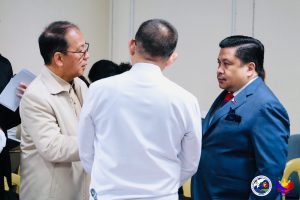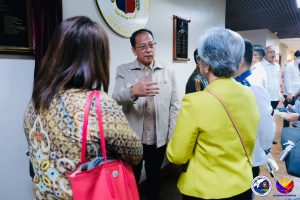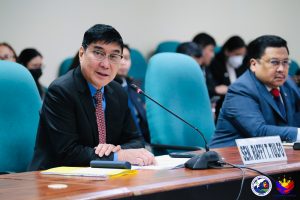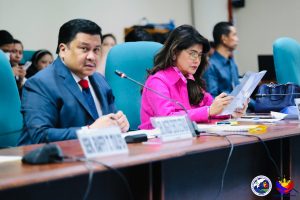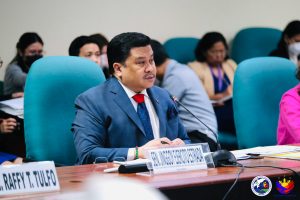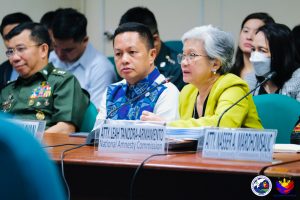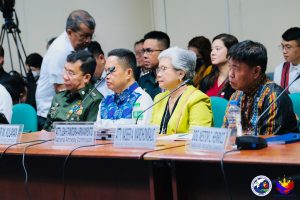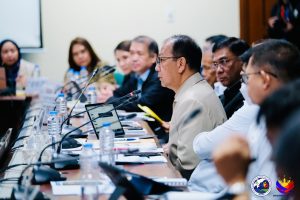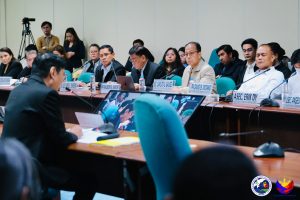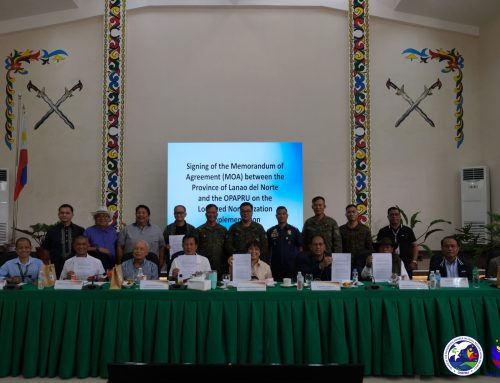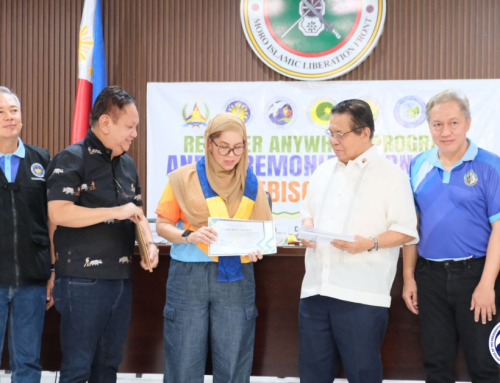PASAY CITY – Presidential Adviser on Peace Reconciliation and Unity Sec. Carlito G. Galvez, Jr. vehemently denied on Tuesday, February 6, that there is corruption involved in the decommissioning process of Moro Islamic Liberation (MILF) combatants.
This developed as Galvez reported on the status of implementation of the MILF decommissioning process during a hearing called for by the Senate Committee on National Defense and Security, Peace Unification and Reconciliation.
“Don’t tell us we’re corrupt,” the peace adviser told Senator Raffy Tulfo during the hearing, which aimed to shed light on why there has been a delay in the implementation of the decommissioning process.
“We take serious offense in what Senator Tulfo said because there is absolutely no truth to that malicious, baseless allegation. To accuse us of such is an affront not only against our agency but also to the decommissioned combatants as well,” he said at the sidelines of the hearing.
In particular, the members of the senate committee, which included Senators Tulfo, Imee Marcos and Jinggoy Estrada, asked Galvez to clarify why there is a “discrepancy” in the cash assistance given to the decommissioned combatants.
To date, a total of 26,132 MILF combatants as well as 4,625 of their weapons, have undergone the process of decommissioning, which is being handled by the foreign-led International Decommissioning Body (IDB).
“Our senators must know that this cash assistance amounting to Php 100,000 for each combatant is part of the socioeconomic package under the Normalization Program of the Comprehensive Agreement on the Bangsamoro (CAB),” Galvez explained.
He stressed that the decommissioning process for former MILF combatants is entirely different from the national government’s other interventions such as the Balik-Baril Program and Enhanced Comprehensive Local Integration Program (ECLIP).
Stringent process
The peace adviser emphasized that all MILF combatants who received financial assistance undergo a stringent validation and verification process to ensure that they are the legitimate beneficiaries.
According to Galvez, the MILF leadership submits its list of validated combatants and weapons directly to the IDB, which has put in place all the necessary safeguards so that no other entity or institution can access the information.
“The list of decommissioned combatants is safely secured and maintained by the IDB and the Department of Social Welfare and Development (DSWD). The list is covered by the non-disclosure agreement and the Data Privacy Act of 2012,” he explained.
“The IDB shall then carries out a verification, registration, validation and inventory of MILF forces and weapons with the assistance of the Verification and Monitoring Assistance Teams (VMATs),” Galvez added.
The VMATs – composed of a representative from Turkiye/Brunei/Norway, Armed Forces of the Philippines (AFP) Philippine National Policy (PNP) and MILF – conducts a careful validation process through interviews and a stringent vetting process at the decommissioning site.
Galvez said that each combatant is then validated and registered through biometrics by the IDB, with their photos and fingerprints taken and printed in the IDB-issued ID or the decommissioned combatant’s ID.
“The information from the same interviews and registration is processed and stored in the IDB’s database system, which is treated with the utmost consideration for the security and confidentiality of the decommissioned combatants,” he said.
Other safeguards
To further enhance the validation process, the GPH and MILF set up a pre-Assembly and Processing Area (Pre-APA) wherein they jointly conduct a pre-screening and pre-registration of MILF combatants who are scheduled for decommissioning.
“The identities of MILF combatants are further verified through civil registration and provision and processing of certificates of live birth to establish their legal identities with the support of the international community,” Galvez said.
After the decommissioning process, he said, the validated and registered combatants are then turned over for a social intake interview under the Task Force for Decommissioned Combatants and their Communities (TFDCC) and DSWD.
“Each decommissioned combatant receives Php100,000 as transitional cash assistance with a DSWD-issued ID (biometric system) to help them in their transition into peaceful and productive civilian life,” Galvez said.
The decommissioned combatants, he said, shall likewise undergo a case management process conducted by the DSWD to ensure that the transitional cash assistance they received is properly utilized.
Galvez said the OPAPRU, through DSWD, has hired case workers to monitor and manage the status of all decommissioned combatants and assess their status, which is crucial in developing socioeconomic interventions for them, their families and communities.
A public trust
With all these safety nets in place, Galvez said the national government is confident that all the three phases of the decommissioning process has been implemented “with utmost integrity and is above-board.”
“We would like to assure our dear senators, that the OPAPRU, in collaboration with concerned line agencies, is doing everything to ensure that the decommissioning process achieves its main objective, and that is, to uplift the lives of our MILF brothers and sisters,” he said.
“As I have emphasized, public service is a public trust. As public servants, we cannot afford to betray the trust of the people we are here to serve. That is anathema to the principles of good, responsible, people-centered governance,” Galvez said. ###




